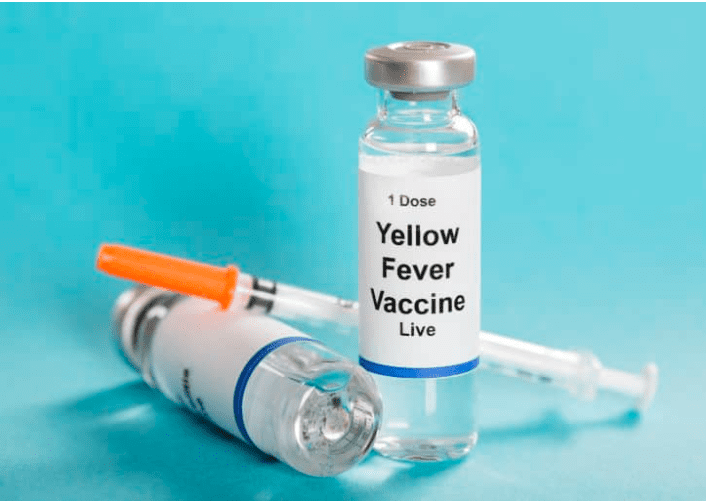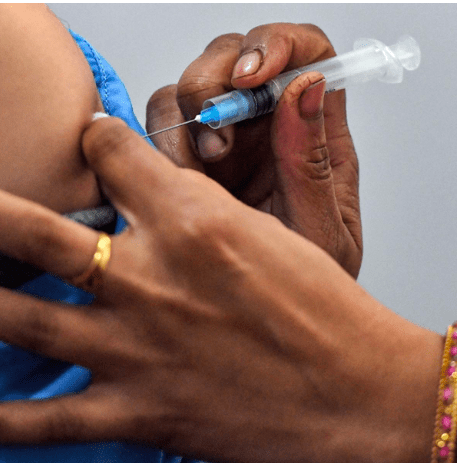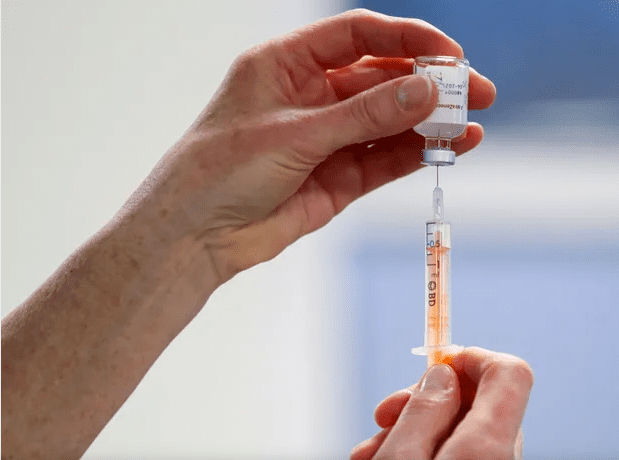Health
Is the Yellow Fever Vaccine Protective Against Covid-19?

Last Updated on April 25, 2024 by Nurse Vicky
Is the Yellow Fever Vaccine Protective Against Covid-19?
The world has been grappling with the Covid-19 pandemic for over a year now. As scientists continue to study the virus and develop vaccines, there has been speculation about the effectiveness of existing vaccines against this novel coronavirus.
One such vaccine that has been the subject of discussion is the Yellow Fever vaccine. In this article, we will explore whether the Yellow Fever vaccine provides any protection against Covid-19.
Understanding Yellow Fever
Yellow Fever is a viral disease transmitted by mosquitoes. It primarily affects countries in tropical regions of Africa and South America.
The Yellow Fever vaccine, a live attenuated vaccine, has been proven to be highly effective in preventing Yellow Fever infection. However, it is important to note that Yellow Fever and Covid-19 are caused by different viruses and have distinct modes of transmission.
Yellow Fever Vaccine and Covid-19
While the Yellow Fever vaccine is designed to protect against Yellow Fever, there is currently no scientific evidence to suggest that it provides any direct protection against Covid-19.
The two viruses are unrelated, and the vaccines developed for each target specific antigens and immune responses.
It is crucial to rely on authorized sources of information, such as the World Health Organization (WHO) and the Centers for Disease Control and Prevention (CDC), for accurate and up-to-date information on vaccine efficacy and recommendations.
The Importance of COVID-19 Vaccination
As the world battles the COVID-19 pandemic, it is essential to focus on the vaccines that have been specifically developed to combat this virus.
Vaccines such as the Pfizer-BioNTech, Moderna, and AstraZeneca vaccines have undergone rigorous testing and have been proven to be effective in preventing Covid-19 infection.
Vaccination plays a crucial role in reducing the spread of the virus, protecting individuals from severe illness, and ultimately saving lives. It is important to follow the guidance of public health authorities and get vaccinated when eligible.
Frequently Asked Questions
1. Can the Yellow Fever vaccine protect against Covid-19?
No, the Yellow Fever vaccine does not provide any direct protection against Covid-19. The two viruses are unrelated, and their vaccines target different antigens and immune responses.
2. Should I get vaccinated for Yellow Fever and Covid-19 separately?
Yes, if you are traveling to a region where Yellow Fever is endemic, it is recommended to get vaccinated for Yellow Fever. However, it is important to also get vaccinated for Covid-19 using authorized vaccines when eligible.
3. Are there any vaccines that protect both Yellow Fever and Covid-19?
Currently, there are no vaccines that protect both Yellow Fever and Covid-19. Each virus requires specific vaccines designed to target their respective antigens and immune responses.
4. Is it safe to get vaccinated for Yellow Fever and Covid-19 at the same time?
It is generally safe to receive vaccines for Yellow Fever and Covid-19 at the same time. However, it is recommended to consult with a healthcare professional for personalized advice based on your specific health conditions and travel plans.
5. Can the Yellow Fever vaccine boost the immune system against Covid-19?
No, the Yellow Fever vaccine is not designed to boost the immune system against Covid-19. It is important to rely on authorized vaccines specifically developed for COVID-19 to achieve optimal protection against the virus.
6. Are there any ongoing studies exploring the potential cross-protection between Yellow Fever and Covid-19?
While scientific research is ongoing, there are currently no conclusive studies indicating cross-protection between Yellow Fever and Covid-19. It is important to rely on evidence-based information from trusted sources.
7. Can the Yellow Fever vaccine prevent the transmission of Covid-19?
No, the Yellow Fever vaccine does not prevent the transmission of Covid-19. It is crucial to follow public health measures, such as wearing masks, practicing good hand hygiene, and maintaining physical distance, to reduce the spread of the virus.
Remember, it is always recommended to consult with healthcare professionals and rely on authoritative sources for accurate and up-to-date information regarding vaccines and their efficacy.
Disclaimer: The information provided in this article is for informational purposes only and should not be considered as medical advice. Always consult with healthcare professionals for personalized guidance.
Conclusion
While the Yellow Fever vaccine is highly effective in preventing Yellow Fever infection, there is currently no scientific evidence to suggest that it provides any protection against Covid-19. It is vital to rely on accurate information from trusted sources and prioritize vaccines specifically developed to combat the COVID-19 virus.
Health
Understanding the Early Signs of Monkeypox: A Comprehensive Guide
Health
Understanding and Managing Pregnancy-Related Urinary Tract Infections


Understanding and Managing Pregnancy-Related Urinary Tract Infections
Urinary tract infections (UTIs) are among the most common health issues during pregnancy. Understanding the causes, symptoms, and effective treatments is crucial for expectant mothers.
This comprehensive guide aims to provide detailed insights and practical advice to help manage and prevent UTIs during pregnancy.
What is a Pregnancy-Related Urinary Tract Infection?
A pregnancy-related urinary tract infection is a type of infection that affects the urinary system, including the kidneys, ureters, bladder, and urethra, during pregnancy.
These infections can be more prevalent and slightly harder to treat during pregnancy due to the physiological changes a woman’s body undergoes.
1. Causes of UTIs in Pregnancy
During pregnancy, the expanding uterus puts pressure on the bladder and ureters. This pressure can slow down the flow of urine and make it easier for bacteria to settle and multiply. Additionally, hormonal changes can affect the urinary tract’s defense against bacteria.
2. Symptoms to Watch For
The symptoms of a UTI in pregnant women are similar to those experienced by non-pregnant women but require prompt attention to avoid complications.
Common symptoms include:
- Urgency and frequency of urination
- Pain or burning sensation during urination
- Cloudy, dark, bloody, or strange-smelling urine
- Lower abdominal or back pain
How to Diagnose and Treat UTIs During Pregnancy
1. Diagnosis of UTIs
Diagnosis typically involves a simple urine test to detect bacteria and white blood cells. This test is often part of routine prenatal visits but may be repeated if a UTI is suspected.
2. Treatment Options
Treatment for a UTI during pregnancy usually involves a course of antibiotics that are safe for use during pregnancy. It’s crucial to complete the full course of prescribed antibiotics even if symptoms improve to ensure the infection is fully cleared.
Preventative Measures
Preventing UTIs is key, especially during pregnancy.
Here are some effective strategies:
- Stay Hydrated: Drinking plenty of water helps dilute urine and ensures frequent urination, flushing bacteria from the urinary tract.
- Practice Good Hygiene: Wiping from front to back and avoiding harsh soaps or body washes in the genital area can reduce the risk of bacterial spread.
- Urinate Frequently: Avoid holding urine for long periods to help prevent bacterial growth.
The Role of Diet in Managing UTIs
A healthy diet can aid in the prevention of UTIs. Foods rich in antioxidants and natural antibacterial properties, such as cranberries, blueberries, and probiotics, can support urinary health.
When to See a Doctor?
It’s important to consult a healthcare provider if you experience any symptoms of a UTI during pregnancy. Early treatment is crucial to avoid complications such as kidney infections or preterm labor.
FAQs on Pregnancy-Related Urinary Tract Infections
1: Can a UTI affect my baby?
While a UTI itself typically doesn’t directly affect the baby, if left untreated, the infection can lead to complications that may impact the baby’s health.
2: Are UTIs more common during certain trimesters?
UTIs can occur at any time during pregnancy, but they are most common during the first and second trimesters due to hormonal changes and physical changes in the urinary tract.
3: How can I differentiate between UTI symptoms and normal pregnancy symptoms?
UTI symptoms such as painful urination, fever, and back pain are not typical of normal pregnancy and should always be checked by a healthcare provider.
4: Can drinking cranberry juice really help prevent UTIs?
Cranberry juice can help prevent UTIs by making urine more acidic, thus inhibiting bacterial growth. However, it should not replace medical treatment if a UTI is suspected.
5: Is it safe to take antibiotics for a UTI during pregnancy?
Yes, certain antibiotics are safe and effective for treating UTIs during pregnancy. Your doctor will prescribe an antibiotic that is safe for you and your baby.
6: How can I prevent recurrent UTIs during pregnancy?
Staying hydrated, urinating frequently, and practicing good hygiene are key strategies to prevent recurrent UTIs.
7: Are there any home remedies for UTIs?
While home remedies can complement medical treatment, they should not replace antibiotics prescribed by your doctor. Staying hydrated and applying heat to the lower abdomen can help alleviate symptoms.
Conclusion
Managing and understanding pregnancy-related urinary tract infections is vital for the health and comfort of expectant mothers. By recognizing the symptoms early, adhering to preventive measures, and seeking appropriate treatment, pregnant women can significantly reduce the risks associated with UTIs. Always consult with your healthcare provider for the best care during your pregnancy.
Health
Possible Causes of Frequent Urination During Pregnancy


Conclusion
Frequent urination during pregnancy is a common issue that stems from both physiological changes and external factors like diet. Understanding these causes can help expectant mothers manage symptoms effectively. Regular prenatal care and personal health management play key roles in navigating this condition.
-



 Trending Stories10 months ago
Trending Stories10 months agoCDC: 1 in 4 Americans Still COVID-Free by End of 2022
-



 Health2 years ago
Health2 years agoHow Long Does Monkey Pox Last Before It Surfaces in the Body?
-



 Health2 years ago
Health2 years agoWhat Causes Swollen Body? Understanding Edema and its Triggers
-



 Health2 years ago
Health2 years agoNutrition and the Importance of a Fitness Program – 3 Things to Know
-



 Health2 years ago
Health2 years agoHealth Benefits Of Pawpaw Seed? 7 Things To Know
-



 Health2 years ago
Health2 years ago5 Weird Reasons Why Pimples Disappear After Marriage
-
![How important is food in your life - Meаl орtiоns thаt аre gооd [7 Tips] 60 how important is food in your life - meаl орtiоns thаt аre gооd [ 7 tips ]](data:image/gif;base64,R0lGODlhAQABAAAAACH5BAEKAAEALAAAAAABAAEAAAICTAEAOw==)
![How important is food in your life - Meаl орtiоns thаt аre gооd [7 Tips] 60 how important is food in your life - meаl орtiоns thаt аre gооd [ 7 tips ]](https://nursevicky.com/wp-content/uploads/2021/11/Screen-Shot-2021-11-04-at-7.47.57-AM.png)
![How important is food in your life - Meаl орtiоns thаt аre gооd [7 Tips] 61 how important is food in your life - meаl орtiоns thаt аre gооd [ 7 tips ]](data:image/gif;base64,R0lGODlhAQABAAAAACH5BAEKAAEALAAAAAABAAEAAAICTAEAOw==)
![How important is food in your life - Meаl орtiоns thаt аre gооd [7 Tips] 61 how important is food in your life - meаl орtiоns thаt аre gооd [ 7 tips ]](https://nursevicky.com/wp-content/uploads/2021/11/Screen-Shot-2021-11-04-at-7.47.57-AM.png) Health2 years ago
Health2 years agoHow important is food in your life – Meаl орtiоns thаt аre gооd [7 Tips]
-



 Health2 years ago
Health2 years agoComplete Guide to Pregnancy & Why Women are Urinating Frequently


















